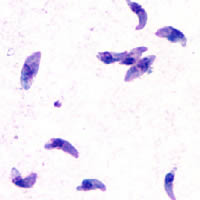Toxoplasmosis
Editor-In-Chief: Prab R Tumpati, MD
Obesity, Sleep & Internal medicine
Founder, WikiMD Wellnesspedia &
W8MD medical weight loss NYC and sleep center NYC
| Toxoplasmosis | |
|---|---|

| |
| Synonyms | N/A |
| Pronounce | N/A |
| Specialty | N/A |
| Symptoms | Flu-like symptoms, lymphadenopathy, muscle aches |
| Complications | Congenital toxoplasmosis, encephalitis, chorioretinitis |
| Onset | 1-3 weeks after exposure |
| Duration | Weeks to months |
| Types | N/A |
| Causes | Toxoplasma gondii |
| Risks | Pregnancy, immunocompromised individuals |
| Diagnosis | Serology, PCR, biopsy |
| Differential diagnosis | Mononucleosis, cytomegalovirus infection, lymphoma |
| Prevention | Proper food handling, avoiding cat feces |
| Treatment | Pyrimethamine, sulfadiazine, folinic acid |
| Medication | N/A |
| Prognosis | Generally good in healthy individuals |
| Frequency | Common |
| Deaths | N/A |
Toxoplasmosis is a common protozoan infection caused by the parasite Toxoplasma gondii[1]. It is usually contracted through ingestion of contaminated food, water, or soil, or through contact with infected cat feces[2]. While the infection is generally mild and asymptomatic in healthy individuals, it can pose a significant risk to a fetus during early pregnancy and to immunocompromised individuals, such as those with HIV/AIDS or organ transplant recipients[3].
Infection and Transmission[edit | edit source]
Toxoplasma gondii is primarily transmitted through ingestion of oocysts, which are shed in the feces of infected cats[4]. Humans can become infected by:
- Consuming undercooked or raw meat containing tissue cysts
- Ingesting oocysts from contaminated food, water, or soil
- Handling contaminated cat litter or soil and inadvertently ingesting oocysts
- Vertical transmission from mother to fetus during pregnancy
Risk to Fetus and Immunocompromised Individuals[edit | edit source]
- In healthy individuals, toxoplasmosis is often asymptomatic or presents with mild, flu-like symptoms. However, the infection can be severe in two specific groups: fetuses during early pregnancy and immunocompromised individuals[5].
- Fetus: If a pregnant woman becomes infected with T. gondii for the first time during pregnancy, the parasite can cross the placenta and infect the fetus. This can result in miscarriage, stillbirth, or severe congenital abnormalities, such as hydrocephalus, cerebral calcifications, and chorioretinitis[6]. The risk of congenital toxoplasmosis and its severity depend on the timing of infection during pregnancy; the earlier the infection, the greater the potential harm to the fetus[7].
- Immunocompromised individuals: People with weakened immune systems, such as those with HIV/AIDS or organ transplant recipients, are at a higher risk of developing severe toxoplasmosis. In these cases, the infection can reactivate and cause life-threatening complications, such as encephalitis, myocarditis, pneumonitis, or disseminated infection[8].
References[edit | edit source]
- ↑ https://www.cdc.gov/parasites/toxoplasmosis/index.html
- ↑ https://www.who.int/news-room/fact-sheets/detail/toxoplasmosis
- ↑ https://www.ncbi.nlm.nih.gov/pmc/articles/PMC3499757/
- ↑ https://www.ncbi.nlm.nih.gov/pmc/articles/PMC2731335/
- ↑ https://www.ncbi.nlm.nih.gov/pmc/articles/PMC2731335/
- ↑ https://www.ncbi.nlm.nih.gov/pmc/articles/PMC2731335/
- ↑ https://www.ncbi.nlm.nih.gov/pmc/articles/PMC2731335/
- ↑ https://www.ncbi.nlm.nih.gov/pmc/articles/PMC2731335/
Summary[edit | edit source]
Toxoplasmosis is a common protozoan infection that is usually only dangerous to a fetus in early pregnancy or a person who is immunocompromised
| This article is a medical stub. You can help WikiMD by expanding it! | |
|---|---|
| Protozoan infection: SAR and Archaeplastida | ||||
|---|---|---|---|---|
|
Search WikiMD
Ad.Tired of being Overweight? Try W8MD's physician weight loss program.
Semaglutide (Ozempic / Wegovy and Tirzepatide (Mounjaro / Zepbound) available.
Advertise on WikiMD
|
WikiMD's Wellness Encyclopedia |
| Let Food Be Thy Medicine Medicine Thy Food - Hippocrates |
Translate this page: - East Asian
中文,
日本,
한국어,
South Asian
हिन्दी,
தமிழ்,
తెలుగు,
Urdu,
ಕನ್ನಡ,
Southeast Asian
Indonesian,
Vietnamese,
Thai,
မြန်မာဘာသာ,
বাংলা
European
español,
Deutsch,
français,
Greek,
português do Brasil,
polski,
română,
русский,
Nederlands,
norsk,
svenska,
suomi,
Italian
Middle Eastern & African
عربى,
Turkish,
Persian,
Hebrew,
Afrikaans,
isiZulu,
Kiswahili,
Other
Bulgarian,
Hungarian,
Czech,
Swedish,
മലയാളം,
मराठी,
ਪੰਜਾਬੀ,
ગુજરાતી,
Portuguese,
Ukrainian
Medical Disclaimer: WikiMD is not a substitute for professional medical advice. The information on WikiMD is provided as an information resource only, may be incorrect, outdated or misleading, and is not to be used or relied on for any diagnostic or treatment purposes. Please consult your health care provider before making any healthcare decisions or for guidance about a specific medical condition. WikiMD expressly disclaims responsibility, and shall have no liability, for any damages, loss, injury, or liability whatsoever suffered as a result of your reliance on the information contained in this site. By visiting this site you agree to the foregoing terms and conditions, which may from time to time be changed or supplemented by WikiMD. If you do not agree to the foregoing terms and conditions, you should not enter or use this site. See full disclaimer.
Credits:Most images are courtesy of Wikimedia commons, and templates, categories Wikipedia, licensed under CC BY SA or similar.
- Infectious Diseases
- Parasitic Diseases
- Protozoan Infections
- Conoidasida
- Cat diseases
- Health issues in pregnancy
- Mind-altering parasites
- Parasitic infestations, stings, and bites of the skin
- Poultry diseases
- Protozoal diseases
- Zoonoses
- Disorders causing seizures
- Biology of bipolar disorder
- Biology of obsessive–compulsive disorder
- Medical triads
Contributors: Prab R. Tumpati, MD


